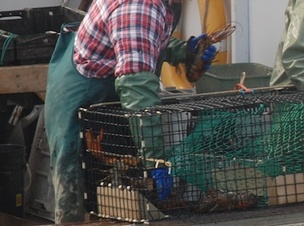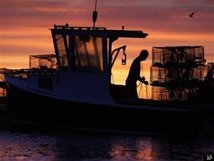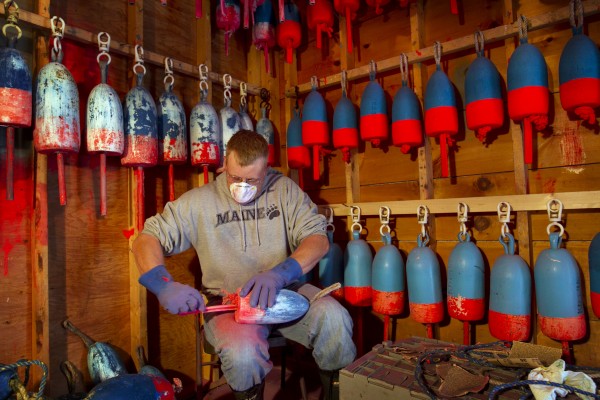 Photo by Melissa Wood Photo by Melissa Wood As fans of The Ghost Trap know, the opening chapter starts with a couple of entitled yachties poaching from a Maine lobster trap for their dinner. This happens way more frequently than you think and it's astounding how some boaters view this as "fair game." Well, it's far from a game, and last month, three Cape Breton lobstermen were charged with killing a man they allegedly caught stealing from their traps. Should anyone die over this practice? No,of course not. But, what if there are few deterrents and all poachers get is a slap on the wrist, legally? This blog post from National Fisherman goes a bit more in depth on the public reaction to the Cape Breton killings, where, according to the author, Melissa Wood said, "Many people disagreed with me, at least on Facebook, where comments were all along the lines that 'he got what was coming to him.' " The following blog post can be found here. The full text follows below: Caught Stealing Last month I wrote that nobody should die over lobster after three Cape Breton lobstermen were charged with killing a man they allegedly caught stealing from their traps. (To update that story, Phillip Boudreau's body has still not been found.) Many people disagreed with me, at least on Facebook, where comments were all along the lines that "he got what was coming to him." It must have been immensely frustrating for the crew of the Twin Maggies, especially since Canadian news outlets report that Boudreau had been (again, allegedly) stealing from them for years. I got more insight about what they may have been up against from "J.R.," who commented on the blog about his experience with a poacher while commercial crabbing. Even though the man was caught and charged, he was not punished beyond a fine and the loss of his recreational license for a year. "If we wanted to pursue getting any compensation for our loss we had to hire a lawyer and sue in civil court. Even the officer handling the case was disgusted [with the] slap on the wrist he got. This would have taken more money and time off the water. So basically the man got a slap on the wrist for taking food off our table," he wrote. Another poaching story came out yesterday from Australia. Commercial crab fisherman Greg Sichter of Sarina Beach was fed up with people stealing from and actually taking his pots. He had lost $4,000 in equipment since Christmas when he decided to take action. The problem is apparently an epidemic there with people thinking of pots as "fair game" according to one official. So Sichter bought bright pink and gray floats so that nobody could claim they mistakenly thought his pots belonged to them, and he bought two portable cameras, which he hid in the mangroves. What he found shocked him: He knew some of the people who were stealing from him. "It really hurts me to think that people who know us, and family people, would do this to us," said Sichter, who turned the images over to police. The violators face up to $55,000 in fines. I understand the fishermen in Cape Breton didn't have mango trees to tie cameras to, but they did allegedly catch Boudreau in the act. Could they have filmed him on their camera phones? Maybe the product companies need to come up with an underwater camera that can be camouflaged in gear? But even that wouldn't do any good if the gear itself is stolen. And after reading what happened to J.R., it made me wonder what options, if any, fishermen have for dealing with people who steal from their traps. For all I know, since few details have come out about the case, the Cape Breton fishermen could have tried many tactics before the violent confrontation with Boudreau. But again, I don't think killing should be a solution. Not only is someone dead, but those fishermen are sitting in jail. How can they support their families now? To read an excerpt of the first chapter of The Ghost Trap (which details this practice) go to Amazon and Look Inside!
1 Comment
 image via Associated press story via by The Associated Press - September 18 2012 Rockland - A Maine lobsterman has been sentenced to 45 days in jail on reduced charges of shooting at a fellow fisherman at a dock in Friendship. Thirty-seven-year-old James R. Simmons pleaded guilty on Monday to misdemeanor charges of criminal threatening and reckless conduct. The victim told the sheriff's department that when he arrived at Wallace's Lobster Wharf on Dec. 4, James Simmons ran back to his truck, pulled out a rifle and fired at him. The victim was not hit. The affidavit said Simmons also threatened to kill the man soon. The victim said Simmons accused him of cutting his lobster traps, which the victim denied doing. Article courtesy of The Bangor Daily News
FRIENDSHIP, Maine — The sinking of two lobster boats is rekindling memories of hostilities among lobstermen two years ago that led to a near-fatal shooting, boats being sunk and a barrage of lobster trap vandalism along Maine’s lobster-rich coast. Someone this week sabotaged two lobster boats, allowing them to drift free and flood with water before washing ashore in this postcard-pretty harbor. The dispute has shone a light on the unwritten rules of the sea, where fishermen often take matters into their own hands to settle grudges. Lobstermen for generations have cut trap lines and shouted threats to settle differences over who can set their traps where. In more extreme instances, they’ve been known to ram boats and fire warning shots into the air. The vandalism crossed the line late Monday night, when the 28-foot Lobstah Taxi and the 35-foot Fantaseas were sunk. Only a portion of the larger boat’s cabin was above water when it was found Tuesday morning on an island outside the harbor. The smaller boat was found on a mainland beach, but escaped serious damage. Investigators don’t know if the attacks were the result of a personal vendetta or a territorial feud. At the least, they’ve brought unwanted attention to this fishing community 75 miles northeast of Portland. “It’s sad, awful sad,” said lobsterman Doug Simmons, 60, as he worked on his gear Thursday in preparation for setting his traps in the coming weeks. “It’s cost people a lot of money.” The boats were owned by Gary Jones and his 15-year-old son, Logan, who live in the neighboring town of Cushing, said Marine Patrol Sgt. Rene Cloutier, who is investigating with the Knox County Sheriff’s Department and the U.S. Coast Guard. “There’s nothing that says this is a territorial thing,” Cloutier said. “It could be, but nothing points that way now.” Gary Jones has been on the receiving end of vandalism before. In 2010, another Cushing lobsterman was charged with cutting 22 of his lobster buoys. At the time, Jones said trap and gear vandalism had cost him nearly $10,000 over three years. Gary Jones’ wife, Tina Jones, said she and her husband aren’t commenting on this week’s incident, adding that her husband and son are hardworking fishermen. “People are looking at us and thinking if that happened to us we must be bad-assed people,” she said. This week’s boat sinkings are bringing back memories of 2010, when hostilities especially were in high gear. On remote Matinicus Island, 20 miles offshore, a lobsterman fired a handgun at two fellow lobstermen, hitting one in the neck in a near-fatal dispute over lobster traps. A jury later found Vance Bunker not guilty of elevated aggravated assault. Two weeks after the shooting, someone sank two lobster boats and damaged a third in Owls Head, another midcoast fishing harbor. Throughout the summer, police investigated a rash of complaints about lobster trap lines being cut, resulting in lost lobster gear. Last year was relatively calm, but the sinkings in Friendship are raising questions about whether this coming summer will be heated. For now, there aren’t any indicators that tensions are ready to erupt, “knock on wood,” said Marine Patrol Maj. Alan Talbot. “Hopefully it’s just a random thing,” he said. “But who knows what’s to come.” Gary Jones’ boat was taken to a boatyard in Owls Head for repairs. His son’s boat sits on boat jacks at Lash Boatyard in Friendship. Lobstermen in town are a reticent bunch, but they’ll tell you they think the perpetrator was from somewhere other than Friendship. The Joneses are from Cushing and don’t even fish the waters off Friendship, they say. “You might be able to say this was a Friendship thing if he fished here — but he don’t,” said lobsterman Kendall Delano as he sanded his trap buoys in a waterfront building. Wesley Lash, who works for his father at the boatyard, said the sinkings don’t reflect well on this sleepy town, which has about 1,200 residents, just a single store and not even a traffic light. “It gives Friendship a bad name,” he said. “People’ll say, ‘Friendship, that doesn’t sound like a friendly place.’” Lash’s father, also named Wesley, said there have been feuds as long as there’s been a lobster industry. “You go from Portsmouth [N.H.] to Eastport and it’s the same thing,” he said. Still, Friendship gets its share of feuding. Simmons remembers years ago when somebody slammed a crowbar through the hull of another boat, causing it to sink. This past winter, somebody fired a shot from a high-powered rifle into the hull of a lobster boat, Cloutier said. The shooting is under investigation. “It happened late at night, nobody saw anything and Friendship is a pretty tight-lipped community,” he said. K. Stephens
You know, I was actually hesitating to write a post about this whole Matinicus shoot up trial because I didn't want to manufacture any negative stereotypes about the way lobstermen do their biz. And since I've never set foot on Matinicus or know any of the parties involved, I'm hardly qualified to play armchair psychologist But when you come across a local columnist who says things like this-- Matinicus Island has long had a reputation as a wild and lawless place. Nineteen years ago the Knox County Sheriff, wanting to bring some law to the island, sent a deputy. The islanders overturned his truck on his lawn and - there is no other way to put it - drove him off the island. No deputy has dared live there since. Read more of this column here. --Well, how can I NOT post something about it? Trap Wars fascinate everyone. it's a major part of The Ghost Trap's plot, but I just wouldn't have the ovaries to write it the way Joe did in his column. Sure, it's his experience, and you can't argue with someone that his perception of an incident or a group of people is wrong. It's his perception; it's the way he sees it. But, is it reality? I'm worried about this fascination with trap wars is turning into a blanket appraisal of how ALL lobstermen handle conflict in Maine. It's not all shotguns and boat sinkings. This isn't The Sopranos in Grundens. You can't call an entire island lawless. My touring partner, Ryan Post couldn't be more irritated by the media attention on this-- Ryan Post of Rockland, a lobsterman who fishes out of Metinic Island about 12 miles west of Matinicus, said he knows the fishermen around Matinicus and he hopes the incident doesn’t cause the rest of the country to think poorly of midcoast fishermen. “We have a bit of black eye because of this case, and it’s getting out all around the United States that we are a bunch of pirates running around the sea,” Post said. “That’s not who we are.” more It's the culture of this island that keeps people riveted. Many island lobstering communities don't have police out there the way the mainland does. They've self-policed for centuries--and they have their own very distinctive rules and norms. James Acheson, author of The Lobster Gangs of Maine, was the first person to articulate what had always been understood cultural behavior around defense of boundaries. According to Acheson, "An older person from an established family with a long history of fishing might infringe on the territorial rights of others almost indefinitely.. . An unpopular person,a young fishermen, or a newcomer encounters trouble more quickly. Sooner, or later, however, someone decides to take action around the interloper. sometimes a small group of fishermen decide to act in concert, but boundary defense is often effected by one person acting alone." The point is these are clans-- these lobster "gangs." They are tight-knit communities whose resources and ability to generate income are limited--that's the reality. The rules state you have to own land on the island and be part of established families to lobster fish. Even sternmen get grilled. "Who are you, who did you apprentice under?" If you are considered a newcomer or an outsider, an established chain of events will happen. First there will be verbal warnings, next there might be visual warnings ( two half hitches around the offending buoy). Don't get the message yet? There will be surreptitious molestation of gear. As we have seen from the events of last summer, it can escalate--and nobody wins in the end. What needs to happen is that if these self-policed communities want to retain their freedoms to remain self-policed, there needs to be self-regulation in times of escalated conflict as well. If that means holding closed-door meetings or inquiries, or even trials, then that's what they need to do so somebody doesn't get killed over it. . But face it. The handshakes and the nicey-nice behavior don't make the news. Two lobstermen who overcome their misunderstandings, who talk it out and effectively manage their own conflict don't sell. But God, can we afford the hype?  By Ryan Post In the news lately, people have been getting the impression that all lobstermen are a bunch of pirates running around with Jolly Roger flags swinging swords and shooting guns. . . and though some do fit that category, it’s not the case for most of us. Trap wars have been going on for generations, but some major things have happened this summer with a shooting, boats being sunk—lots of traps being cut all up and down the coast, including mine. In this industry, you walk a fine line—if you put your tail between your legs when someone cuts your traps—you’re done. But if you go off and be a pirate and cut someone else’s traps—you’re also done. All that has been going on up and down the coast is that we’re not getting enough money for our product. Tensions are high and people are really struggling right now. At it stands, even I don’t know how I’m going to make it through the winter. What's happening is lobstermen are not very happy with their economic situation and some think the grass is greener on the other side—or the fishing is better over in someone else’s territory as the case may be—and they don’t always obey the invisible territory lines. When people are really struggling, losing their boats, behind on their mortgage payments, that’s when you see bad behavior. I don’t condone the piracy and I don’t cut traps. Our family has never gone down that road. I don’t do it because I don’t want people cutting mine (even though they still do). If you get caught whacking those traps off, you could lose your license for two or three years. And people who retaliate are usually the ones who get caught. Still, I get why people on the outside are fascinated by this—it’s not like the politics they deal with in their office, but it’s not a Hollywood movie, it’s real to us. And when lobstermen are getting a fair boat price, that’s when you will see things settle down and find peacetime on the water. My friend K. Stephens just released her first novel, The Ghost Trap, the story of Jamie Eugley, a young lobsterman struggling with the grinding responsibilities of a head-injured fiancée and mounting trap wars in the midcoast. The Ghost Trap seems to be art imitating life with the timing of trap wars this summer. What’s honest about some of these scenes is that you may think you know who cut traps (which almost always starts the wars), but you don’t really know for sure. And isn’t that the truth about how trap wars sometimes start…and end? I loved this book when I read it. It really hit home and relates to a lot of how I grew up on an island. Jamie is born and raised around a lobstering community in a small town in Maine and has loyalty and dedication to the industry, with a lot of drama around trap wars as well as a romance that is doomed. When I read it, it didn’t almost seem like fiction, but like I was reading pages from my life and how I grew up. This character doesn’t lie down and let people run over him and his family, but at the same time, he’s hard working, well spoken and not the one to start conflict –and that’s what I relate to. People have the misconception lobstermen aren’t educated or intelligent, but it’s just the opposite. You have to have intelligence, navigational skills, be able to operate a boat, have common sense and an unbelievable work ethic to survive in this business. When you’re on a boat, anything can happen at any time. There are no tow trucks that come out and jump-start you. You need to adapt, overcome, find solutions to fix the problem and that comes down to time on the water, a lot of experience and again, common sense. Put me in most situations on the water or off, I’d rather have a lobster fisherman with me than someone who has a mega IQ but who has no common sense and couldn’t find his way out of a paper bag. With The Ghost Trap and my educational DVD, Maine Buggin, K. and I will be going around to bookstores and events all over Maine this fall. We’re going to take an ordinary book signing and turn it up a notch by bringing some real excitement to the lobstering industry. Splicing excerpts of her novel that relate to chapters of my DVD, we plan to bring energy, passion and the educational perspective to how lobster traps work, how invisible territory lines are drawn, and why trap wars usually happen outside of the news. I don’t think anyone’s ever done this before where a novel and an educational DVD dovetail so well. (Join this Facebook Fan Page to learn more.) I wrote this column because all people are hearing in the news about lobstermen are the negatives and they need to be reminded of the positives, such as the fact that we are the original environmentalists, conservationists and stewards of our sustainable industry because of the methods we’ve used over generations of our fishery. There is a lot of good in what the majority of us do. So, look for K. and me this fall—ask us any questions. Our first official appearance will be during Windjammer Weekend, Saturday September 5 at Sherman’s Bookstore in Camden from 1-3 pm. If it’s a nice day, you’ll see us out on the sidewalk. Come on by. |
Author
Columns and news about the subculture of Maine lobstering. Archives
May 2024
Categories
All
|

 RSS Feed
RSS Feed
